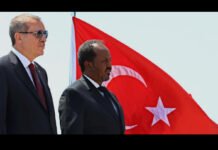By Horn Africa News
MOGADISHU – Villa Somalia is grappling with mounting political turmoil in Hirshabelle State, where long-standing clan rivalries have complicated the delicate process of leadership and governance. The crisis has intensified in recent weeks amid accusations of political exclusion and the dominance of a single clan in both state and federal leadership.
At the center of the dispute is the fact that both Somalia’s President Hassan Sheikh Mohamud and Hirshabelle’s President, Ali Abdullahi Hussein “Gudlawe,” hail from the same Abgaal sub-clan of the Hawiye. This overlap has fueled accusations from rival clans, particularly the Hawadle, that Villa Somalia is deliberately sidelining their interests and entrenching clan-based favoritism in Hirshabelle’s politics.
Hawadle Clan’s Rejection Since 2016
The Hawadle clan—one of the largest and most influential communities inhabiting the Middle Shabelle and Hiiraan regions—has consistently rejected Hirshabelle’s political framework since the state’s formation in 2016. Community leaders argue that the state structure was engineered in a way that undermines their political weight, leaving them underrepresented in key decision-making bodies.
For years, Hawadle elders have demanded that the state presidency rotate between clans to ensure fairness and balance. Their calls, however, have gone largely unanswered, deepening mistrust toward both Villa Somalia and Hirshabelle’s regional administration.
Accusations Against Villa Somalia
Critics accuse Villa Somalia of ignoring the Hawadle’s grievances while consolidating power through Gudlawe’s presidency. This, they argue, has created a system where government appointments and development projects disproportionately favor Abgaal-dominated areas, while communities in Hiiraan—largely populated by the Hawadle—remain marginalized.
Analysts say this perceived bias has not only weakened the state’s political legitimacy but has also contributed to chronic underdevelopment in Hiiraan, further fueling discontent. “Hirshabelle is one of the weakest federal states because its foundation is rooted in exclusion,” said one political observer in Mogadishu.
Calls for Power-Sharing and Reform
Observers warn that the concentration of power in the hands of one clan risks destabilizing Hirshabelle. Local elders and civil society groups are increasingly calling for a power-sharing arrangement that reflects the state’s demographic realities. Proposals include restructuring the regional government, creating guarantees for clan-based inclusivity, and granting more autonomy to Hiiraan’s local leadership.
Without reforms, critics argue, the state will remain plagued by recurring political crises that hinder service delivery, security stabilization, and economic progress. Hirshabelle has already fallen behind other federal member states in terms of governance and development, a failure many attribute to its unresolved internal divisions.
Risk of Destabilization
Political analysts caution that if Villa Somalia continues to dismiss local grievances, tensions could escalate into open confrontation. Clan disputes in Hirshabelle have previously led to violent clashes, displacements, and disruption of federal stabilization programs.
“The current situation is unsustainable,” one analyst told Horn Africa News. “Unless Villa Somalia and Hirshabelle leaders open space for genuine dialogue and inclusivity, the state risks sliding into deeper instability that could spill over into other regions.”
For now, Hirshabelle remains fragile, caught between the federal government’s political maneuvers and the demands of its own marginalized communities. The outcome of this standoff will be a key test for Villa Somalia’s ability to balance federal authority with local clan realities.




